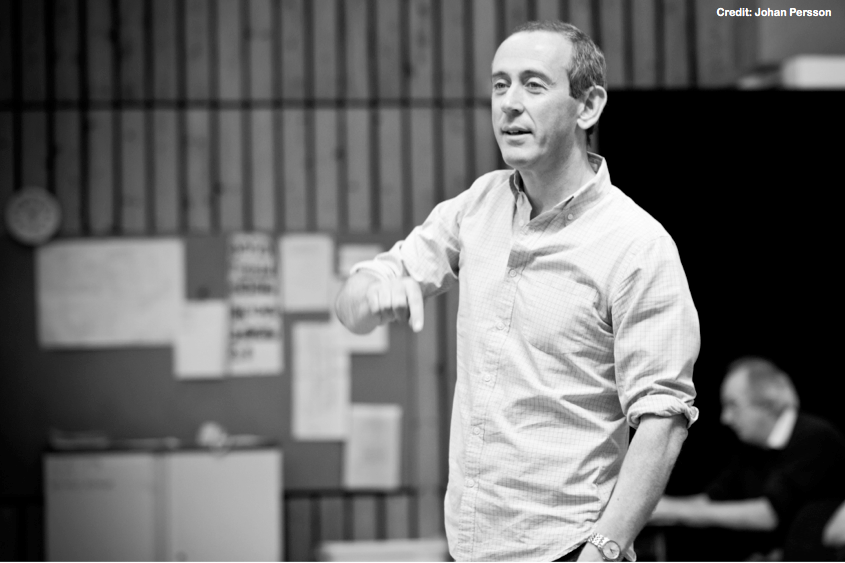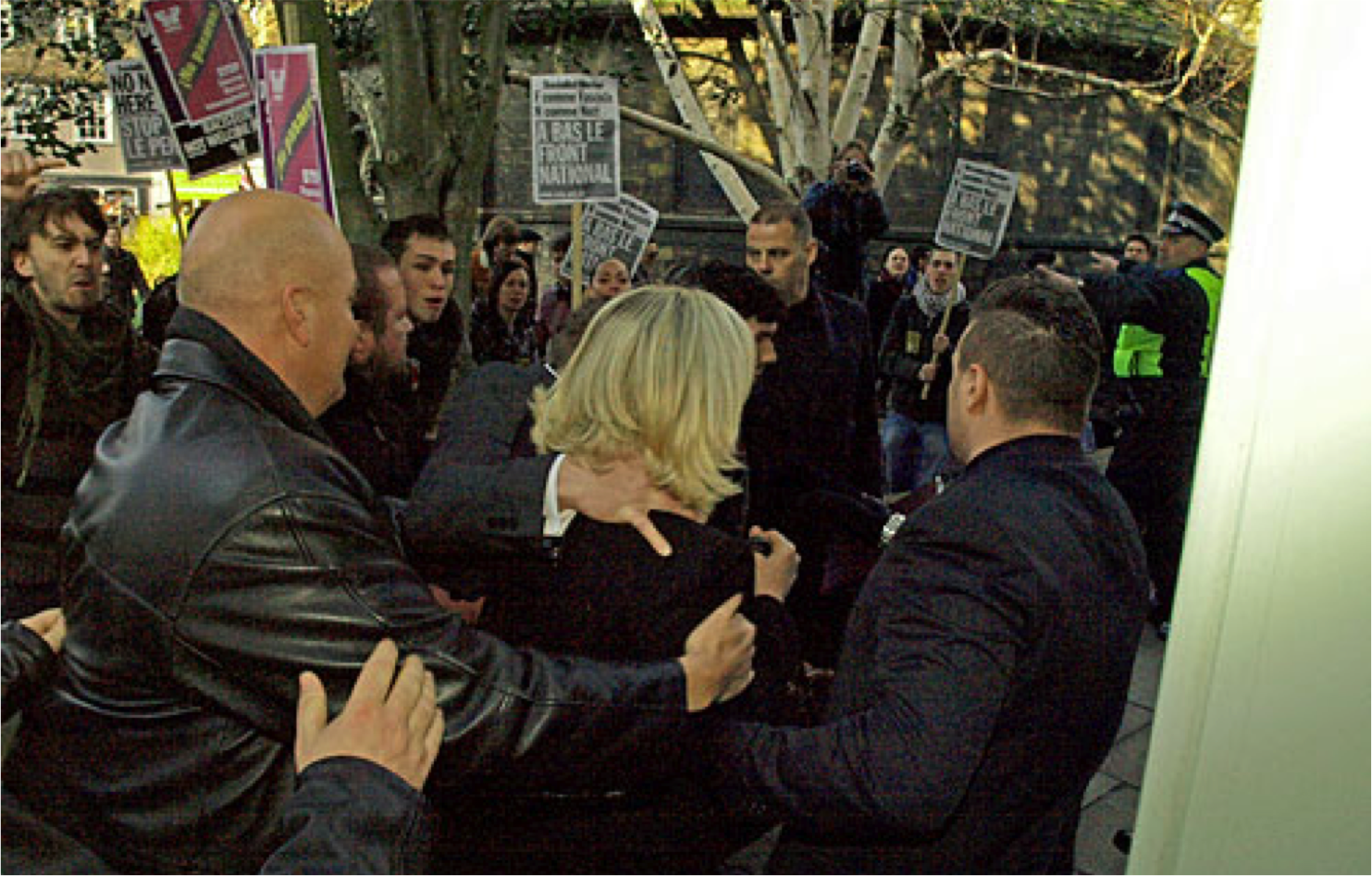Nicholas Hytner’s Othello was so good I saw it twice. It’s not the first time Sir Nick has wowed the critics. And I somehow doubt it will be the last. I perch comfortably outside his office, staring at black-and-white action shots of hit after hit: Adrian Lester in Henry V, Simon Russell Beale in Much Ado About Nothing, James Corden in One Man, Two Guv’nors. If there’s such thing as a grammar of theatre, Hytner is fluent in it.
These days, he needs little introduction: the Cambridge alumnus who arrived at the National Theatre in 1990 has become one of Britain’s most well-respected directors. One bookshelf in his office hosts a glass poster for One Man, Two Guv’nors; another holds mugs commemorating the first night of each Shakespeare play he’s directed. The Othello mug sits atop an unfingered script on the glass coffee table that separates us.
“None of these texts exists in isolation,” Hytner says, as if he’s noticed me looking at the mugs that sit side by side on the shelf. “You kind of take [their] temperature;” he tells me, “every time you put them on, probably every time you read them, the temperature will change.” Indeed, Hytner is well known for his modern adaptations (Othello takes place at a military base that recalls recent wars in Iraq and Afghanistan), and that fact underpins much of his philosophy: “what it says about our world is as much to do with our world as it is to do with the text.”
The air conditioning shuts off. Hytner apologises, gets up, fiddles with the machine. It’s the first time I’ve looked outside since I entered the room. Late afternoon, and the view must be one of the best in London. The last sunbeams dance on buildings that spear the sky—Blackfriars Bridge, St Paul’s, the Gherkin beyond—each mingling with each. It feels as though the current of the Thames is driving daylight away, pushing it inch by inch towards the margins of evening. It’s not long before he returns to his seat, clears his throat, and resumes: “If you’re performing Shakespeare, you’re only ever going to take a snapshot of it. There’s always next time.”
It’s difficult not to be drawn in by the wonderful mildness of Hytner’s voice, and the diagonal smile that flashes across his face whenever he stumbles upon the mot juste. I ask which Shakespeare character he identifies with most. For a moment, he sits forward in his black leather chair like a kid forced to pick between his favourite toys. “Benedick I like enormously,” he concludes. What attracts him so much to the protagonist of Much Ado About Nothing (aside from the actor he cast to play him, Simon Russell Beale) is his willingness to do “something suicidally brave for Beatrice,” his adversary-cum-lover, when he challenges his former best friend Claudio to a duel he has little chance of winning. Hytner doesn’t even think “you’d want to hang out with Hamlet as much as you’d like to hang out with Benedick.”
On Hytner’s watch, Shakespeare has become a vital force in the National’s bloodstream. In fact, an awful lot has changed since his first days in the job way back in April 2003. He settles a jeaned leg lightly on the coffee table, before reminiscing: “I do look back on 2003 and think that almost every one of the big decisions could have gone the other way.” Fortunately, they didn’t. Jerry Springer the Opera turned out better than expected (“and the people it offended it was good news to offend,” he adds); new plays in the intimate Cottesloe Theatre saw success; and His Dark Materials took the plaudits. “They all worked—every single one.” His relief and disbelief, even ten years on, is palpable.
“I wonder what I would say,” comes his inquisitive reply when I ask what advice he’d give to his former self if he could rewind a decade. He pauses for a while. I’ve got used to his way of sending his words across to me like chess pieces, each move contemplated and considered: “I think I would say, ‘you will never regret being wild and bold, and turning down the tasteful option in favour of the rough, provocative one.’ That’s what I’d say,” he reaffirms, this time with certainty. “Ticking over” isn’t the Hytner way. “I’ve never regretted having messy things,” he says, “but I’ve regretted having boring things. I’ve hated that.”
What people think of his work barely registers. “I don’t care really. I don’t care,” he reiterates firmly. He seems more genuine than blasé: “I’m very happy to get from day to day, and year to year.” His chair rotates slightly, and leans his chin gently against finger and thumb. Theatre is demanding at the best of times, but it hasn’t jaded him. “To a very large degree,” he continues, “if I get to my last day here without the place sliding down the pan; if I can feel that for 12 years, it has deserved its title and it was as good as it needed to be, I’ll be very happy.”
And his legacy? Hytner’s not too bothered about that, either. He draws a parallel, hands moving in sync with voice, between theatre and film: “movie directors very much build up a legacy: it’s there, it’s immovable. They spend their retirement going from retrospective to retrospective and festival to festival being lauded and honoured,” he laughs. But the beauty of theatre lies in its ephemerality; night after night, season after season: “it’s here, it’s there, it’s gone.”
Soon enough, that will be the fate of Sir Nicholas’ tenure at the National. But, characteristically, he won’t make a point of his departure: “I don’t think I want to do a big farewell spectacular,” he tells me. “I’ve got 18 months more, I’m just finishing off the planning for next year, and I think I should just try and do the same as I’ve always tried to do.” He shifts in his chair and his voice sinks low, as if he doesn’t want to presume too far: “at some point, I guess I’ll want to do what everybody else has done—sit down and try to write about what I’ve found out so far. But I’d much prefer just to go on and work.”
The National will be a strange place when Hytner steps down from his post in 2015. I, for one, am too young to remember what it was like before he took the helm. One thing is certain, though: his successor has the mother of all boots to fill. We stand, exchange thanks, and he opens the door. I take a last look out of the window, before exiting, stage left.

